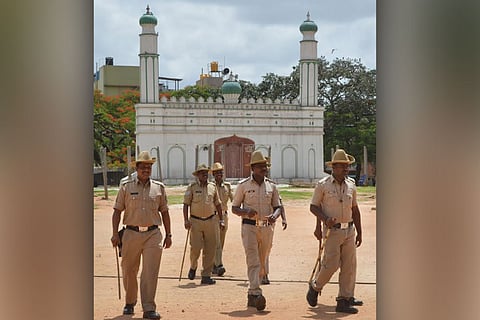

Hindu organisations in Karnataka have set their eyes on a new project — the two-acre Eidgah Maidan in Bengaluru’s Chamrajpet area is the bone of contention this time. Over the last few days, several Hindu groups have submitted pleas for festivals to be celebrated in a ground that is currently used as a public space but also serves as a ground for Muslims to offer namaz. The Eidgah ground’s ownership is ambiguous, and this is being used for further polarisation by the said groups.
At the time of writing this article, at least four Hindu groups, including Hindu Janajagriti Samithi and Sri Rama Sene, have submitted letters seeking the BBMP’s permission for celebration of several festivals at the Eidgah Maidan in Chamarajpet. They have also sought to celebrate International Yoga day and Independence Day at the ground, along with festivals like Ganesha Chaturthi and Dasara. Their request is still pending with the BBMP.
The Hindu groups have alleged that the Minutes of Meeting (MoM) from a 2006 meeting that took place between several stakeholders including BBMP and Wakf Board officials, local elected representatives, and the then Minorities Affairs minister Zameer Ahmed Khan showed that a decision was taken to open the ground for celebration of Hindu festivals too. TNM has not been able to independently verify this claim.
Speaking to TNM, Hindu Janajagruthi Samithi’s Mohan Kumar Gowda alleged that the previous governments were refusing permission only because they wanted to appease Muslims. He added that they are hopeful that this time around, they will be allowed to celebrate festivals at the ground. He denied that it could lead to communal tensions or law and order issues as namaz is offered there only twice a year. He added that if permission is not granted, they will seek the court’s intervention.
Eidgah ground’s history
The land has been disputed for many decades. Over 10 acres of land were given to the Muslim community by the royal Wodeyar family of Mysuru several decades ago to be used as a burial ground, as well as for Eidgah. Eidgah is a space for prayer for the Muslim community to offer the Eid prayers twice a year; it's usually an open ground.
But decades later, a long legal battle ensued and in 1964, the Supreme Court had settled that the land belongs to the Central Muslim Association (CMA). Over years, the size of the land shrunk to two acres 10 guntas after the burial ground was shifted to a different location near Mysore Road. So what remained was just a land for Eid prayers to be offered in front of an existing minbar. The rest of the year, the space, around which the city has rapidly grown, is used by the public for many purposes — from cow grazing to children playing sports.
The Karnataka Wakf Board gazetted the Eidgah ground to be under its custody in 1965, run by the CMA.
The location of the land is critical to why it has been contested. On one side of the ground are Muslim population pockets that include parts of Chamrajpete, Padarayanapura, and the areas surrounding KR Market near which the Jamia Masjid is situated. On the other side are the Sangh Parivar strongholds including Basvanagudi, where the offices of the Rashtriya Swayamsevak Sangh (RSS) and Vishva Hindu Parishad (VHP), and the Shankar Mutt are situated.
In 2013, there had been a confrontation between police and RSS workers and leaders including the former Union Minister Ananth Kumar, when over 500 RSS members tried to pass through the Eidgah Maidan during their annual Vijayadasami march. The police had at that time prevented the march from passing through, saying that this was a deviation from the permitted route and it could cause communal tensions. The Congress was in power in the state then.
Tussle between two government departments
Somewhere down the line, around 2019, inexplicably BBMP officials produced a document showing they had possession of the land. On June 6, 2022, Harish Kumar, the BBMP Special Commissioner, told the media that they are in possession of the Eidgah Maidan and except on the two days when Muslims offer Eid namaz, permission for other activities (including religious ones) can be considered. He, however, did not say if any permissions sought recently by Hindu groups will be granted, and chose to vaguely add that they will look at the documents and consider requests.
BBMP officials say that a survey showed that the land belonged to the BBMP West Division, and added that according to the SC ruling of 1964, except on days when Eid prayers were being offered, the ground can be used for any other purpose on any other day — a claim strongly contested by the CMA.
The CMA maintains that while other activities can be allowed on the land, activities related to any other religion would be a violation. They have questioned if the BBMP would allow namaz to be offered on land attached to any government-run temple.
After public statements by the BBMP officials, the CMA has submitted letters to the BBMP asking the municipal corporation to take a relook at the documents before making statements. Meanwhile, the Minority Affairs department is steadfast that the 1964 SC ruling prevails and the land is Wakf property.
But that's not all. Yet another government department is a stakeholder in this — the Bengaluru Police. In the past too, owing the communally sensitive nature of the ground, the decision of allowing any programs or functions there has rested with the police, as is the case for most open grounds in the city. There have been representations given to them asking for permission for several Hindu festivals to be celebrated at the Eidgah ground including the Maha Shivaratri this year, all of which have been denied by the police citing law and order reasons.